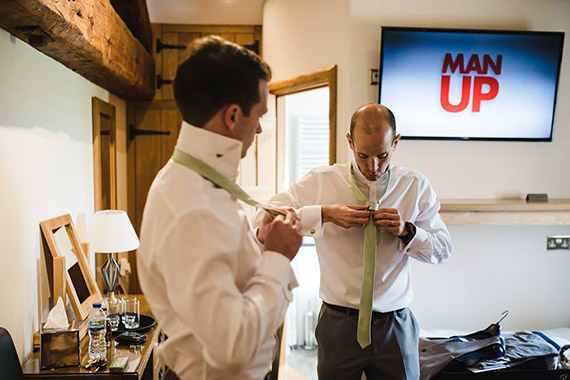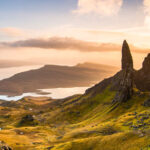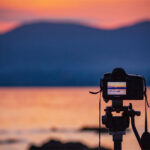As a wedding photographer it’s imperative you provide images that your couples will love, but it’s equally necessary to stay inspired and shoot for yourself. Wedding photographers must advance in their skills year on year, grow, and produce stunning images.

Not altering the wedding scene helped here. I never turn off TVs, etc. Here the advert “man up” was on the screen for a couple of seconds, but I had my eye on it and quickly captured this shots of the guys getting ready.
I realized very early on that the only way to improve my images was to take more. A famous Henri Cartier-Bresson quote, “Your first 10,000 photographs are your worst,” eludes to the fact that with practice you will improve. During your first 10,000 images, you will get some awesome shots, but most will be unworthy of showing publicly. However your rate of keepers and standard of images will improve as you train yourself to be a better photographer.
I shoot weddings in a documentary style, and 98 percent of the day is unposed, fly on the wall stuff (the other 2 percent is a small number of groups and portraits). I don’t move objects, open curtains, ask people to move, or interfere in anyway. There are only so many weddings you can shoot, so for me street photography was the obvious place to turn for inspiration and practice.
So many elements of street and wedding photography are alike. Searching for moments that are unexpected, it’s about how you see the world and the way you capture it. I genuinely think that street photography is the closest you can get to training to be a better wedding photographer.
I shoot street whenever I can. I always have a camera on me (my iPhone, at least), as images can present themselves anywhere. Once a year I travel abroad and shoot pure street for 4–5 days as part of the 8street collective. We’re a group of wedding photographers that strive to improve via street photography. Along with shooting on my own personal travels it’s my main investment in training each year.
Relating Street Photography to Wedding Photography
Street photography is about capturing individual images with a story contained within or questions asked. In this respect it is very familiar to wedding photography—although it’s important to convey the wider story of the wedding, and your focus is inevitably more on specific people. I find street photography a challenge, and many days of shooting street can be frustrating. But when you get a good image it’s worth it.
All the images below are completely unposed street and wedding images taken by me.
Improving Your Composition
Wedding photography is not just about shooting what is happening in front of you but trying to capture that in an image that has artistic merit. I believe that the composition of street (and wedding) photography should not be overly reliant on rules. But knowing how and when to use them can help create better images. Simple rules like using frames, placing subjects on thirds, and layering can all be practiced in street and applied in wedding photography.
Framing
A frame within a frame is a simple way to enhance an image.

Framing in Street Photography

Framing in Wedding Photography
Rule of Thirds
Placing your subject on a third of the image can increases or decrease tension.

Rule of Thirds in Street Photography

Rule of Thirds in Wedding Photography
Complex Frames/Layering
Something I’m always trying to do in wedding photography. Ensure that no heads overlap, a challenge in busy bridal prep. Adding layers to an image will give a sense of depth. Something Alex Webb does spectacularly.

Layering in Street Photography

Layering in Wedding Photography
Candid Environmental Portraits
An candid environmental portrait is not just a portrait, but an unposed moment that has a story, a sense of place, or tells us who the person is. The street photograph below was spotted while walking through Paris with my wife, the second at a wedding at Eastnor Castle.

Environmental Street Portrait

Environmental Wedding Portrait
Being Ready
You should know your camera gear inside out and be ready to capture an image in a split second. You never know what’s going to happen at a wedding—the same is true on the street! Always have your camera turned on, exposure correct, and focus ready.
Seeing Light
Seeing light is one of the key aspects for any photographer. I’ve found it takes practice. Street photography is that practice for me. I now feel I can see changes in light automatically without thinking. Even while walking the dog I can appreciate it! At a wedding it’s easy to be taken in by the moment and completely forget about the light. Often a simple sidestep will allow you to use the light to its full advantage.

Using Light in Street Photography

Using Light in Wedding Photography
Being Observant
Our surroundings change constantly, and generally we tune out all the adverts and background noise—especially at a wedding. But using these elements can give your images an extra dimension, a sense of story, or an injection of humor. Keep an eye on the background; if you see something interesting, keep it in mind—another element might come along.
Spotting the Unusual
Keeping my eyes peeled and being observant is my favorite way to shoot street. I walk and walk, hoping to find something unusual or funny. Some sort of everyday life that everyone else seems to pass by. Training your eyes and mind to do this makes spotting it on the wedding day so much easier.

Unusual Street Scene

Unusual Wedding Scene
Patience
Being patient is key to creating many great photos—seeing an image in your head before it happens or spotting a scene of interest and waiting for something or someone to enter it to give it that extra element. I have stood in one area for an hour waiting for all the elements of a street image to come together (and often they don’t!). When the photo comes together, it’s a great feeling. We don’t always have the luxury of such time at weddings, but keeping your eyes open and waiting for an extra element often pays off.

The advert on the right rotated every few seconds. I got lucky that the lady in red shoes entered the frame at the right moment.

Waiting for something interesting to happen to a scene at weddings can pay off.
A Different View
It’s easy to shoot a wedding day from standing height all day. But moving around, shooting over balconies, capturing images from floor level, or holding your camera above your head all provide a different viewpoint on the story.

Shooting Down on a Street Scene

A bride and groom await their wedding breakfast. Captured from a balcony above them.
Reflections
Reflections can be a little overdone by wedding photographers, but I still think there is place for good reflection images. They can add that extra element that makes a shot interesting. Looking for a different type of reflection shot (not just a bride looking at herself in the mirror) will be made easier by spotting these types of scenarios in non-wedding environments.

I waited for a while for this image to come together.

Reflections Through a Car Window
Shooting street is a very personal experience. It’s one of the only types of photography that includes people and can be taken solely for the pleasure of shooting—there is no one to please or brief to fulfill. Waiting for that moment to come together, and capturing it when it does, is why so many people do it.
Enjoy the process of shooting street, and don’t be focused on getting “likes” online. Slowly the skills you learn on the street will spread into your wedding photography.
About the Author:
Based in Cheshire, UK, Adam Riley shoots weddings full time. He was awarded the Professional Photography Magazine‘s Reportage Wedding Photographer of the Year and is also a multi award winning member of the Wedding Photojournalistic Association. See more of his work at Adam Riley Photography or find him on Instagram.
Like This Article?
Don't Miss The Next One!
Join over 100,000 photographers of all experience levels who receive our free photography tips and articles to stay current:







Great article, Thank you! Indeed, street and wedding photography are very similar in some situations! Definitely it is worth to practise wedding photography skills on the streets.